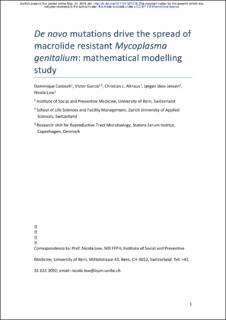Bitte benutzen Sie diese Kennung, um auf die Ressource zu verweisen:
https://doi.org/10.21256/zhaw-3856| Publikationstyp: | Weiteres (textuelles Material) |
| Titel: | De novo mutations drive the spread of macrolide resistant Mycoplasma genitalium : mathematical modelling study |
| Autor/-in: | Cadosch, Dominique Garcia, Victor Althaus, Christian L. Jensen, Jorgen Skov Low, Nicola |
| DOI: | 10.21256/zhaw-3856 10.1101/321216 |
| Umfang: | 25 |
| Erscheinungsdatum: | 24-Mai-2018 |
| Verlag / Hrsg. Institution: | Cold Spring Harbor Laboratory |
| Sprache: | Englisch |
| Schlagwörter: | Mycoplasma genitalium; Mathematical modelling; Sexually transmitted diseases |
| Fachgebiet (DDC): | 570: Biologie |
| Zusammenfassung: | The rapid spread of antimicrobial resistance in sexually transmitted infections caused by Mycoplasma genitalium is a growing concern. It is not yet clear to what degree macrolide resistance in M. genitalium results from the emergence of de novo mutations or the transmission of resistant strains. We analysed epidemiological data and developed a compartmental model to investigate the contribution of de novo macrolide resistance mutations to the spread of antimicrobial resistant M. genitalium. We fitted the model to data from France, Sweden and Denmark and estimated treatment rates and the time point of azithromycin introduction. In a meta-analysis of six studies, we estimated that de novo resistance develops in 12% (95% CI 7-17%, I2 44%) of azithromycin treated M. genitalium infections. Our model shows that the high probability of de novo resistance accelerates the spread of antimicrobial resistant M. genitalium in comparison with lower probabilities. The estimated per capita treatment rate in France was lower than in Denmark and Sweden but confidence intervals for the three estimates overlap. The estimated dates of introduction of azithromycin in each country are consistent with published reports. We conclude that clinical management strategies for M. genitalium should seek to limit the unnecessary use of macrolides. |
| URI: | https://digitalcollection.zhaw.ch/handle/11475/7945 |
| Volltext Version: | Entwurf |
| Lizenz (gemäss Verlagsvertrag): | CC BY 4.0: Namensnennung 4.0 International |
| Departement: | Life Sciences und Facility Management |
| Organisationseinheit: | Institut für Computational Life Sciences (ICLS) |
| Enthalten in den Sammlungen: | Publikationen Life Sciences und Facility Management |
Dateien zu dieser Ressource:
| Datei | Beschreibung | Größe | Format | |
|---|---|---|---|---|
| 321216.full(1).pdf | De novo mutations drive the spread of macrolide resistant Mycoplasma genitalium: mathematical modelling study | 1.06 MB | Adobe PDF |  Öffnen/Anzeigen |
Zur Langanzeige
Cadosch, D., Garcia, V., Althaus, C. L., Jensen, J. S., & Low, N. (2018). De novo mutations drive the spread of macrolide resistant Mycoplasma genitalium : mathematical modelling study. Cold Spring Harbor Laboratory. https://doi.org/10.21256/zhaw-3856
Cadosch, D. et al. (2018) De novo mutations drive the spread of macrolide resistant Mycoplasma genitalium : mathematical modelling study. Cold Spring Harbor Laboratory. Available at: https://doi.org/10.21256/zhaw-3856.
D. Cadosch, V. Garcia, C. L. Althaus, J. S. Jensen, and N. Low, De novo mutations drive the spread of macrolide resistant Mycoplasma genitalium : mathematical modelling study. Cold Spring Harbor Laboratory, 2018. doi: 10.21256/zhaw-3856.
CADOSCH, Dominique, Victor GARCIA, Christian L. ALTHAUS, Jorgen Skov JENSEN und Nicola LOW, 2018. De novo mutations drive the spread of macrolide resistant Mycoplasma genitalium : mathematical modelling study. Cold Spring Harbor Laboratory
Cadosch, Dominique, Victor Garcia, Christian L. Althaus, Jorgen Skov Jensen, and Nicola Low. 2018. De Novo Mutations Drive the Spread of Macrolide Resistant Mycoplasma Genitalium : Mathematical Modelling Study. Cold Spring Harbor Laboratory. https://doi.org/10.21256/zhaw-3856.
Cadosch, Dominique, et al. De Novo Mutations Drive the Spread of Macrolide Resistant Mycoplasma Genitalium : Mathematical Modelling Study. Cold Spring Harbor Laboratory, 2018, https://doi.org/10.21256/zhaw-3856.
Alle Ressourcen in diesem Repository sind urheberrechtlich geschützt, soweit nicht anderweitig angezeigt.